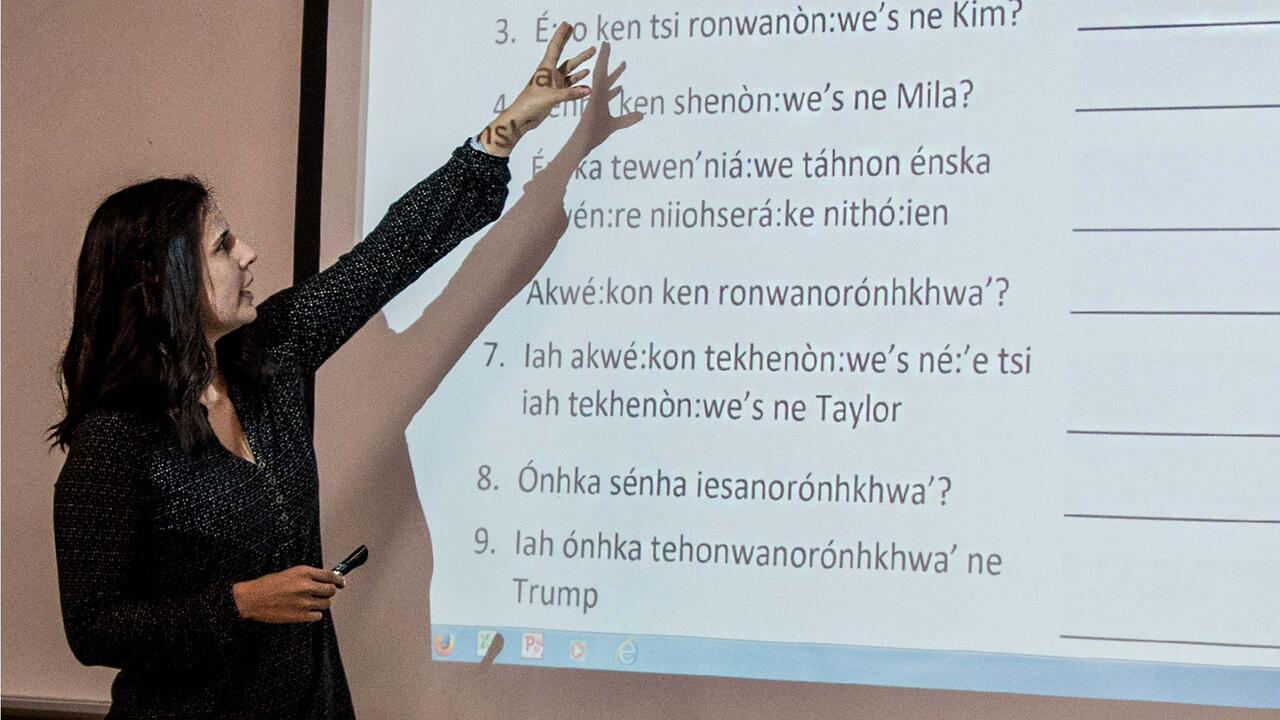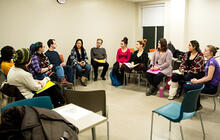
First Indigenous language course offered at Waterloo
Mohawk language instructor hopes to build bridges for both Indigenous and non-Indigenous students

Mohawk language instructor hopes to build bridges for both Indigenous and non-Indigenous students
By Taylor Legere University Relations“Shé:kon, oh niiohtonhátie?,” “Hi, how are you doing?” is one of the first phrases taught in the University of Waterloo’s first Indigenous language course, Introduction to Kanien’kéha.
The Mohawk language course is being offered at Renison University College, partly to fulfill the recommendation from the Truth and Reconciliation Commission (TRC) of Canada for post-secondary institutions to create degree programs in Indigenous languages.
Nicole Bilodeau is teaching the course this term to a combination of students with Indigenous and non-Indigenous backgrounds. Bilodeau is a graduate of the Mohawk language immersion program offered through Onkwawenna Kentyohkwa (Our Language Society) in the Six Nations Grand River Territory.
“As a Mohawk person I think it’s important to teach the Mohawk language to gain recognition of the importance of not just Mohawk - but other Indigenous languages as well,” said Bilodeau. “To gain awareness about the fact that a lot of our languages are dying.”
The Mohawk language class will be offered again in the winter 2018 term in addition to the next level up for students currently in the class. For more information on how to enroll please contact the Renison registrar’s office.
 Bilodeau advises students considering enrolling in the class to, “make the commitment come to every single class, and check your ego at the door because it’s going to be different from anything that you’ve ever studied before.”
Bilodeau advises students considering enrolling in the class to, “make the commitment come to every single class, and check your ego at the door because it’s going to be different from anything that you’ve ever studied before.”
“The environment I try to create is that we can laugh at ourselves when we make mistakes,” continues Bilodeau. “If people can come into the classroom with a good attitude they’re going to do fine.”
Renison’s academic dean, Kofi Campbell, emphasizes the importance of teaching Indigenous languages as part of the University’s responsibility to bring back a part of the culture that has been lost.
“Universities have been one of the largest instruments of colonialism and contributed to the destruction of First Nation’s ways of life,” said Campbell. “It is incumbent upon us to therefore take a lead in this part as well - and to try to do our best to do our part to revitalize and to help to preserve both the languages and the cultures that have been oppressed in this country.”
Kofi also stresses the importance of spreading the work being into the community. Renison and the Waterloo Aboriginal Education Centre are working with the community and with Six Nations of the Grand River Territory in Brantford, ON to identify which Indigenous languages to focus on next and work towards meeting the other TRC calls to action.
“Our goal is to get Indigenous youth back involved in the communities and we think that language is a great bridge into that.” said Campbell.
We acknowledge that we are on the traditional territory of the Neutral, Anishnawbe and Haudenosaunee peoples.

Read more
Researchers awarded funding to investigate ecology, climate change, repatriation, health and well-being through cultural and historical lens

Read more
Meet the 14 exceptional students representing Waterloo’s newest grads

Read more
More than 100,000 children and youth from across the region are discovering the wonders of science and technology through the University of Waterloo
The University of Waterloo acknowledges that much of our work takes place on the traditional territory of the Neutral, Anishinaabeg, and Haudenosaunee peoples. Our main campus is situated on the Haldimand Tract, the land granted to the Six Nations that includes six miles on each side of the Grand River. Our active work toward reconciliation takes place across our campuses through research, learning, teaching, and community building, and is co-ordinated within the Office of Indigenous Relations.